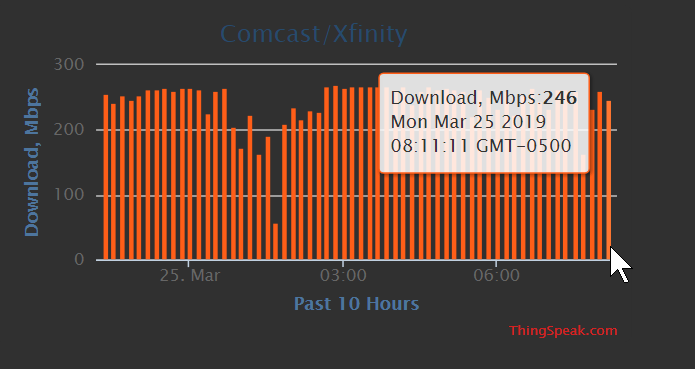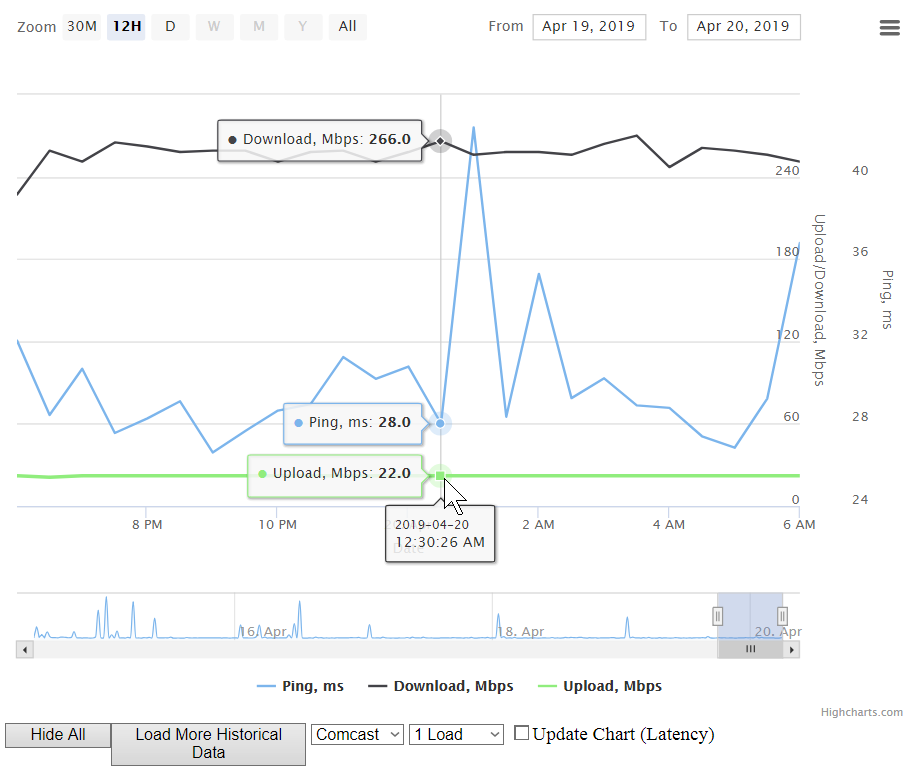Speedtest CLI. Run speedtest on pfSense box
-
Or just use 2.2.5; python is already there.
$ file /usr/local/bin/python2.7 /usr/local/bin/python2.7: ELF 64-bit LSB executable, x86-64, version 1 (FreeBSD), dynamically linked, interpreter /libexec/ld-elf.so.1, for FreeBSD 10.1, stripped -
curl -Lo speedtest-cli https://raw.githubusercontent.com/sivel/speedtest-cli/master/speedtest_cli.py
chmod +x speedtest-clinano speedtest-cli
change
#!/usr/bin/env pythonto
#!/usr/local/bin/python2.7;)
-
Just wanted to post this update here for others who use this tool - it is now a package and can be installed using
pkg install py27-speedtest-cliThen just run
./usr/local/bin/speedtest-cli -
Is there no GUI version of this?
My ubnt USG Pro has a speed tester app on it's firewall GUI. I don't see how it's anymore complicated to get one for Pfsense.
Thanks,
-
Is there no GUI version of this?
My ubnt USG Pro has a speed tester app on it's firewall GUI. I don't see how it's anymore complicated to get one for Pfsense.
Thanks,
No, because speed testing from the firewall itself is inaccurate and unreliable. We don't want to encourage people to rely on bad data. See my previous response on this thread.
-
Actually this is a good thing to use if you suspect your switch or cabling may be contributing to a loss of bandwidth. This would narrow the points of failure to your firewall, the connection between your firewall and gateway and the gateway itself. If you have a large difference between what this cli test reports and what you see in a speed test from your pc you just gained valuable troubleshooting information.
-
I agree. It can have the standard YMMV/caveat attached, but I have gotten a ton of useful information from having the speedtest_cli pkg installed on my remote units. In my testing, a C2xxxx CPU is more than capable of pulling 400-500Mbps directly with this tool. Very useful!
-
I use this to keep my ISP honest, which is a trick in itself :) For those that are interested here's my hack:
Go to www.thingspeak.com and register for a free account, create a channel with three fields (I only care about ping, DL and UL, you may want more), go to the API page and make a note of your write API.
Do the stuff to get speedtest on your firewall, run a speedtest and note which server it decides is your local/fastest - I use the one hosted by my ISP, for example. Then run a speedtest –list | grep <your chosen="" server="" name="">to get the ID (eg. speedtest --list | grep Virgin in my case)
Run a speedtest --server <the id="" you="" found="">--csv to test
Edit the speedtest.py file and add these bits - note, this isn't clean or clever, I've gone with functional!
- Under the other import lines at the top:
import urllib2 myAPI="<your api="" key="" goes="" here,="" in="" the="" quotes="">" baseURL = 'https://api.thingspeak.com/update?api_key=%s' % myAPI print baseURL</your>Then go down to around line 700 and look for the CSV output section, add the lines with -> below
def csv(self, delimiter=','): """Return data in CSV format""" data = self.dict() out = StringIO() writer = csv.writer(out, delimiter=delimiter, lineterminator='') row = [data['server']['id'], data['server']['sponsor'], data['server']['name'], data['timestamp'], data['server']['d'], data['ping'], data['download'], data['upload']] writer.writerow([to_utf8(v) for v in row]) -> f = urllib2.urlopen(baseURL + "&field1=%s&field2=%s&field3=%s" % (self.ping, self.download, self.upload)) -> print f.read() -> f.close () return out.getvalue()Now run speedtest.py –server 1234 --csv and wait for it to finish, now check on ThingSpeak and check your three fields now have data.
I then put the command in my crontab:
*/30 * * * * /usr/local/bin/python2.7 speedtest.py --server 1234 --csv >/dev/null 2>&1and now every 30 minutes my firewall does a speed test and updates ThingSpeak, which I can check the lovely graphs and make sure I'm relatively consistently getting decent metrics.</the></your>
-
Just wanted to post this update here for others who use this tool - it is now a package and can be installed using
pkg install py27-speedtest-cliThen just run
./usr/local/bin/speedtest-cliGracias era lo que buscaba
-
@icewraithuk What a great hack & thanks for letting me discover ThingSpeak!
I changed the output from bits/sec to Mbit/sec:
f = urllib2.urlopen(baseURL + "&field1=%s&field2=%s&field3=%s" % (self.ping, int(self.download) / 1048576, int(self.upload) / 1048576)) -
Sorry, I know this is an old topic but how to I uninstall this package? I used the following to install but don't see it listed under the package manager and would like to remove it.
pkg install py27-speedtest-cli -
You should be able to do a "pkg remove <package name>" from the cli via ssh
-
@raidarray said in Speedtest CLI. Run speedtest on pfSense box:
You should be able to do a "pkg remove <package name>" from the cli via ssh
Thank you!
-
Hi all
Not sure if this is still actively being requested but as a learning exercise for myself i've created a small widget that runs a speedtest from the dashboard happy to share. I'm not really a CLI guy so went down the GUI/Widget route.

Full how to can be found @ https://www.spacejunk-inc.com/pfsense/widget/speedtest/2019/03/10/Speed-Test-Widget.html
please let me know what you think, is it useful? how can i improve it?
-
Nice !
But keep in mind :
@jimp said in Speedtest CLI. Run speedtest on pfSense box:
No, because speed testing from the firewall itself is inaccurate and unreliable. We don't want to encourage people to rely on bad data. See my previous response on this thread.
@raidarray said in Speedtest CLI. Run speedtest on pfSense box:
how can i improve it?
By adding the option to select the server being used to test ?
Default, speed-test used the closed server on "the list". -
@icewraithuk said in Speedtest CLI. Run speedtest on pfSense box:
I use this to keep my ISP honest, which is a trick in itself :) For those that are interested here's my hack:
Very cool. Greetings from the Future!
EDIT - What fun! I was able to combine instructions from both @icewraithuk and @raidarray and throw this chart into the Dashboard using the dark theme. It runs the CLI speedtest against the lowest ping server every 10 minutes, posts to Thingspeak and the Dashboard reads back the Public feed.

-
@icewraithuk Am I missing something or does one have to have a university or company email account? It definitely did not seem to like the gmail account!
-
@kcallis I just used an Outlook.com account. BTW, the post above from @icewraithuk was posted 2 years ago and it was his only post ever on the forum.
PS - I found a cool chart in the ThingSpeak forums with a chart template that consolidates the CSV data produced by @icewraithuk 's method that I managed to modify to show my upload/download/ping data all in one chart, but you'll need to muddle through the edits manually. There are notes in the .html file that tell you where to put your info. Not saying it's the best data set, but a fun excercise anyway.
https://community.thingspeak.com/forum/announcements/thingspeak-live-chart-multi-channel-second-axis-historical-data-csv-export/
-
@provels That is rad but it seems like running speedtest every ten minutes would be quite a burden on your WAN connection. Can you post the PHP you used for the widget? Thanks.
-
@0daymaster I run the speedtest every 30 minutes now, but it's just me, so who cares? You pretty much need everything in this thread to do what I did.
1 - Install speedtest-cli on the FW. Run some tests from the shell to get a feel for it.
2 - Setup a Thinkspeak.com account and do the @icewraithuk edits to the speedtest.py file (make @cukal 's edits for Mbps instead of MB if you wish).
3 - Now you should be able to send the data to Thinkspeak to generate the graphs. Format them in the style/colors as you wish. You'll use the
Read API Key to post the data you'll add to the widget.
4 - Then just use @RaidArray 's instruction to add the URL for your chosen Thingspeak graphs and to create the widget you can load from the FW homepage.
5- You can DL the html file from the Thingspeak forum post and edit it in a text editor to make it useful for your data. I didn't incorporate it into the FW homepage, though. I now also use a Windows version of speedtest-cli (Google) running as a scheduled task on an inside server so the tests actually run through the FW rather than from it
All credit goes to everyone else. I just managed to screw some parts together, in spite of myself.